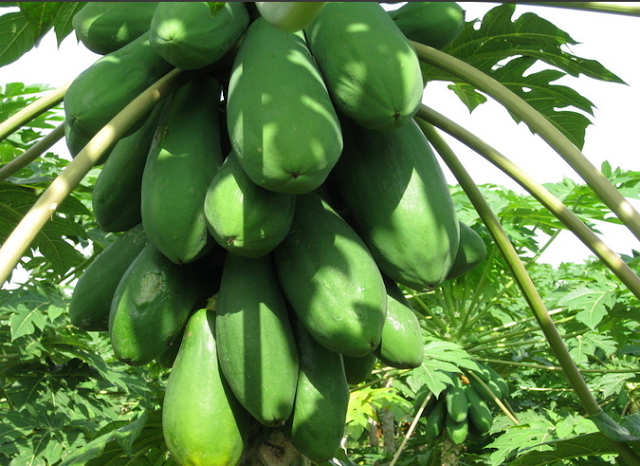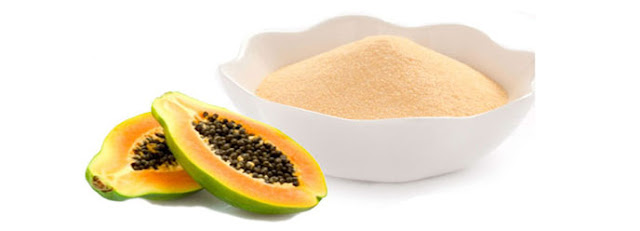Papain is a powerful digestive enzyme commonly found and extracted from the papaya fruit (Carica papaya) , it is also referred to as papaya proteinase. The papaya enzyme papain plays a key role in digestive processes involving breaking down tough protein fibers. For this reason, it has been commonly used in its native South America as a digestive support for meat eating. Science is catching up with the wisdom of traditional healers in South America. Papain can play a significant role in the breakdown of toxins and is a powerful digestive aid and antioxidant.
Papain is usually produced as a crude, dried material by collecting the latex from the fruit of the papaya tree. The latex is collected after scoring the neck of the fruit whereupon it may either dry on the fruit or drip into a container. This latex is then further dried. It is now classified as a dried, crude material. A purification step is necessary to remove contaminating substances. This purification consists of the solubilization and extraction of the active papain enzyme system through a government registered process. This purified papain may be supplied as dried powder or as a liquid.
The papaya enzyme papain is able to break down larger proteins into smaller proteins or peptides or even into the smallest amino acid subunit by cleaving the bonds in the interior of the protein chain or the end of the chain (endopeptidase and exopeptidase activity, respectively) in a broad pH range. This gives it a marked ability to enhance the total digestive process and increase the nutrient absorption of protein-based foods. Its ability to hydrolyze (break down) proteins also means that it can play a key role in many normal physiological processes and potentially influence disease processes for the good.
Papain is the most temperature stable and can require a temperature as high as 170-185oF to completely inactivate it. This has certain advantages and certain disadvantages. The main disadvantage is that a piece of meat cooked to what we call “medium rare” will not reach a temperature high enough to inactivate the papain. Thus, subsequent storage of the meat will allow the enzyme to continue to tenderize and if extended over too long a period will produce a mushy unpalatable texture. Papain should be used in very controlled processes where each step and cut of meat is under controlled time and temperature and served properly to the consumer. This is the best process for large scale highly organized restaurant chains where the process is thoroughly outlined and adhered to. The pH optimum of papain is typically similar to that of meat itself.
The term proteolytic actually means protein digesting and, as an enzyme, papain is one of the most effective at breaking down meat and other proteins, comparable to the enzyme pepsin that we produce in our pancreas. Papaya enzymes protein In fact, papain is often preferred to pepsin in scientific cell isolation procedures as it is considered a more effective enzyme. It is also used commercially as a meat tenderizer. Papain works by cleaving the peptide bonds of complex proteins, breaking them down to their individual amino acids, ready for use in the growth and repair of your body.
Introducing the papaya enzyme papain into a meal containing meat can significantly speed up its digestion. It may also help with the breakdown of other ‘troublesome’ proteins, such as the gluten in wheat and the casein in milk, that are often implicated in digestive problems.


